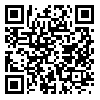Volume 28 - Supplementary
IBJ 2024, 28 - Supplementary: 415-415 |
Back to browse issues page
Download citation:
BibTeX | RIS | EndNote | Medlars | ProCite | Reference Manager | RefWorks
Send citation to:



BibTeX | RIS | EndNote | Medlars | ProCite | Reference Manager | RefWorks
Send citation to:
Mosaferi S, Dashti M, Khani-Eshratabadi M. Therapeutic Effects of CAR-T Cells in Adults with Relapsed/Refractory Acute Myeloid Leukemia: A Systematic Review. IBJ 2024; 28 :415-415
URL: http://ibj.pasteur.ac.ir/article-1-4852-en.html
URL: http://ibj.pasteur.ac.ir/article-1-4852-en.html
Abstract:
Introduction: Acute myeloid leukemia (AML) is the most common leukemia in adults and the second most common leukemia occurring in children; relapsed/refractory AML patients have a poor prognosis and the treatment remains challenging. Successful development and implementation of new medicine treatment approaches for patients with AML, which may improve leukemia remission, is thus a major priority. Chimeric antigen receptor (CAR) T-cell immunotherapies have induced remarkable responses in patients with relapsed/chemorefractory B-lymphoblastic leukemia. We aimed to study the therapeutic effects of CAR T-cell in adults with relapsed/refractory AML (RR/AML).
Search Strategy: In this systematic review, studies were included from Scopus, PubMed, WOS, and Google Scholar databases (without timing). Two researchers independently and systematically searched using keywords: ("CAR T-cell" OR "Chimeric Antigen Receptor T-Cell") AND ("Therapeutics"[Mesh]) AND ("Leukemia, Myeloid, Acute"[Mesh]). Combining keywords and free text was used to broaden the search results. Subsequently, inclusion criteria were (English language, AML disease, CAR-T cell therapy) and exclusion criteria (non-English, other leukemias, other cell therapy, AML animal models/cell lines). Clinical Trial studies were included; Case reports, experts' opinions, editor letters, and reviews were excluded. Two researchers have individually extracted data, including the primary author's name, publication year, Trial Phase, patient characteristics, sample size, age range, sex, intervention methods, Route/dose, response, and side effects. In instances of disagreement, a third researcher was consulted for further evaluation.
Results: A total of 722 studies were identified. After excluding duplicate and unrelated articles, 206 were screened, of which 63 articles were selected for the screening of titles and abstracts eligibility assessment. After the full-text assessment, seven studies were included. These seven studies evaluated CAR-Tcell therapies with various targeting, including (1) CLL-1, (2) CD7, (3) NKG2D Ligands, (4) Anti-CLL1, (5) anti-LeY, (6) CD33 in 40 RR/AML patients in phases I and I/II. 26patients achieved complete remission, while 12patients showed objective responses and 3patients died. Fifteen patients observed cytokine release syndrome (CRS) and non-CRS in 18 patients; no dose-limiting toxicities, no patient developed CAR-T cell-related encephalopathy syndrome, and no GVHD. Most patients experienced low-grade and manageable adverse events.
Conclusion and Discussion: Based on our results, CAR T-cell therapy has the potential to be a safe and efficient alternative treatment for RR/AML and, therefore, requires further investigation.

Search Strategy: In this systematic review, studies were included from Scopus, PubMed, WOS, and Google Scholar databases (without timing). Two researchers independently and systematically searched using keywords: ("CAR T-cell" OR "Chimeric Antigen Receptor T-Cell") AND ("Therapeutics"[Mesh]) AND ("Leukemia, Myeloid, Acute"[Mesh]). Combining keywords and free text was used to broaden the search results. Subsequently, inclusion criteria were (English language, AML disease, CAR-T cell therapy) and exclusion criteria (non-English, other leukemias, other cell therapy, AML animal models/cell lines). Clinical Trial studies were included; Case reports, experts' opinions, editor letters, and reviews were excluded. Two researchers have individually extracted data, including the primary author's name, publication year, Trial Phase, patient characteristics, sample size, age range, sex, intervention methods, Route/dose, response, and side effects. In instances of disagreement, a third researcher was consulted for further evaluation.
Results: A total of 722 studies were identified. After excluding duplicate and unrelated articles, 206 were screened, of which 63 articles were selected for the screening of titles and abstracts eligibility assessment. After the full-text assessment, seven studies were included. These seven studies evaluated CAR-Tcell therapies with various targeting, including (1) CLL-1, (2) CD7, (3) NKG2D Ligands, (4) Anti-CLL1, (5) anti-LeY, (6) CD33 in 40 RR/AML patients in phases I and I/II. 26patients achieved complete remission, while 12patients showed objective responses and 3patients died. Fifteen patients observed cytokine release syndrome (CRS) and non-CRS in 18 patients; no dose-limiting toxicities, no patient developed CAR-T cell-related encephalopathy syndrome, and no GVHD. Most patients experienced low-grade and manageable adverse events.
Conclusion and Discussion: Based on our results, CAR T-cell therapy has the potential to be a safe and efficient alternative treatment for RR/AML and, therefore, requires further investigation.

| Rights and permissions | |
 |
This work is licensed under a Creative Commons Attribution-NonCommercial 4.0 International License. |







.png)
